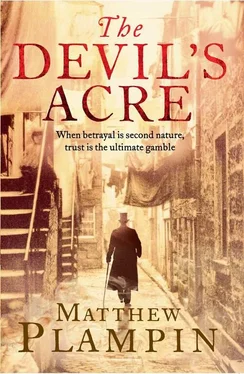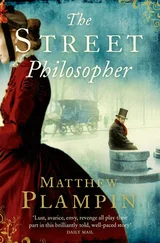1 ...7 8 9 11 12 13 ...25 Colt considered this for a moment. He could see the angle, and it was a damn sharp one. ‘I…was conscious of such a bond, yes – an Anglo-Saxon bond, exactly as you describe it.’ He felt himself warming to the theme. ‘The Colt Company is in the process of taking on English hands as we speak. It has always been my goal, Mr Street, to give this venture of mine a transatlantic character. Why, two of my closest London employees, my personal secretary and my press agent, are Englishmen, taken on for their knowledge of how things are over here.’
Street seemed to approve of all this. ‘You must repeat these sentiments often, Colonel, and loudly. It will detract from those who cite your nationality as the primary reason to reject your inventions – and they will remain our most tenacious opponents, I promise you.’
This unaccountable man then looked back briefly at the embassy doors, which were being held ajar for him; he’d got what he wanted from Sam and was about to go back inside. He came halfway down the steps, jerking along in that peculiar way of his, and extended his hand. Sam went back up to meet him and they shook firmly.
‘Know that you have your London allies,’ Street said, producing a card and laying it across Sam’s palm. ‘We shall speak again when your cause is more advanced. Good night to you, Colonel.’
The doors shut solidly behind him. Sam muttered in bemusement, pulling on fine calfskin gloves as he turned towards the square. Carriages lined the black oval of lawn in its centre, their lamps out, waiting for the reception’s end. He spotted his own quickly enough, despite the sooty gloom; its superiority was apparent even among the conveyances of Buchanan’s noble guests. His coachman was not expecting to be called for at least another hour, and would probably be dozing on his box.
The gun-maker took out a screw of Old Red and cut a generous plug. As he ground it between his teeth, feeling the rich tobacco set his mind afire and his fingers tingling inside his gloves, he ran through what had just transpired on the embassy steps. Something satisfactory had been achieved, of that he was certain; although now he thought hard about it he couldn’t say exactly what it might be. It had to be admitted, also, that he’d allowed himself to be put off the scent. Street had sidestepped his demands for information with professional efficiency. The identity of the Colt Company’s unseen supporters, of these men who supposedly watched his progress with such close interest, remained unknown.
Starting over to his carriage, Sam paused beneath a street lamp and flipped over the card. Hon. Lawrence Street, MP, it read; Lord Commissioner of the Treasury, Whitehall.
Bolted down in its brick cradle, the engine was like a captive whale exhausted after a long struggle with the harpoon, emitting great sighs of white steam and the occasional high-pitched ping. It had been idling for the past two hours, but was still scalding hot; Martin heard Mr Quill curse as he brushed against the shining side of its copper boiler. The time was almost upon them. He looked over at Pat, Jack and the rest. They were hefting their shovels, ready to work. The warmth and closeness of that engine room was something devilish, and it was filthy too, grease, sweat and coal-dust mingling on every face and pair of arms to form a slick second skin. Darkness had fallen outside, and the factory lamps were lit. To Martin’s right, through the short passageway that led from the engine room to the forging shop, he could see a shadowy row of drop-hammers, standing before their clay ovens like so many giant corkscrews. The mass of operatives had been gone now for over an hour, and away from the wheezes of the engine the building was quiet. Martin had stayed on, as he did every night. Mr Quill welcomed this diligence, and he was pledged to do whatever was necessary to secure the chief engineer’s trust.
This campaign, in truth, was already pretty well advanced. Martin had been appointed as Mr Quill’s assistant on the basis of his easy aptitude with the drop-hammer – something that had taken him quite by surprise, as he’d never so much as touched a forging machine before being taken on at Colt. Quill had told him that he had a natural knack for machine-work, and would not hear his protestations of ignorance.
‘Learning is over-rated, Mart,’ he’d said in his Yankee burr. ‘Diligence is what’s required, in the first instance – diligence in the service of a willing spirit. We’ll soon have you up to speed.’
The foremost task before them was the engine, and it was a pressing one. Colonel Colt himself would come by regularly to see how they were progressing, and remind Mr Quill in strikingly straightforward language that the whole London enterprise was dependent upon his success. The engineer had talked Martin through the contraption’s main fault: the stroke was wrong for the diameter of the driving cylinder, he’d explained, which set the pulleys out of true and prevented the machinery from working anywhere close to as well as it could. Remarkably, Martin found that he could not only follow what he was being told, but apply it usefully to his labours. Mr Quill soon pronounced him invaluable, and took to asking his opinion as well as issuing instructions. They’d worked on the engine side by side, cursing the inept English makers who’d put the damned thing together.
A critical point had been reached, and Mr Quill had asked him to form a team of stout-hearted bravoes who would stay on after hours with them to help with some final modifications. Martin had promptly nominated the half-dozen of his bonded brothers who’d secured themselves a place in the American factory. At first, Pat Slattery hadn’t been best pleased. His view of their task at Colt was a determinedly simple one.
‘Why the hell,’ he’d spat, ‘should I give one o’ these Yankee bastards a second’s more dominion over me than he already damn well has?’
But Martin had reasoned with him, arguing that the more they learnt about the place, and the more trust they could earn from the Yankees, the better their chances would be. Eventually, even Pat had to admit the sense in this. The Irishmen had stepped forward as one, and started tightening pistons and adjusting valves under Mr Quill’s kindly, unsuspecting direction.
The chief engineer emerged from behind the engine, a large wrench in his hands. He was grinning fiercely, his hair sticking up like a crazy pagan crown, his leather apron stretched tight over his round belly. The black grease on his forearms almost obscured the chequered snakes that had been tattooed there, twisting down from his elbows. After giving Martin an assured wink, he turned towards Mr Stickney, the giant of a foreman, who lingered out in the foundry passage.
‘We’re just about ready here, Gage,’ he boomed. ‘Are the machines prepared?’
‘Sure are, Ben,’ Stickney replied. ‘Set your micks to work. I’ll head upstairs.’
Mr Quill gave Stickney a cheerful salute and opened the boiler hatch. Taking up his own shovel, he joined Martin and the others beside the fuel bin. Together they stoked the engine, the coal hissing off their shovels onto the wallowing fire within. Once it was up and roaring again, Mr Quill slammed the hatch shut and turned his attention to the engine’s valves. Slowly, the pistons stirred, gears and pulleys started to move, and the revolver factory creaked into life around them. Straight away Martin noticed that there was a new pace to the engine, a regular smoothness that had not been there that afternoon. The engineer and his assistant smiled at each other. The labour of the past week was paying off.
‘Sounds pretty goddamn good, don’t she,’ cried Mr Quill.
Читать дальше












